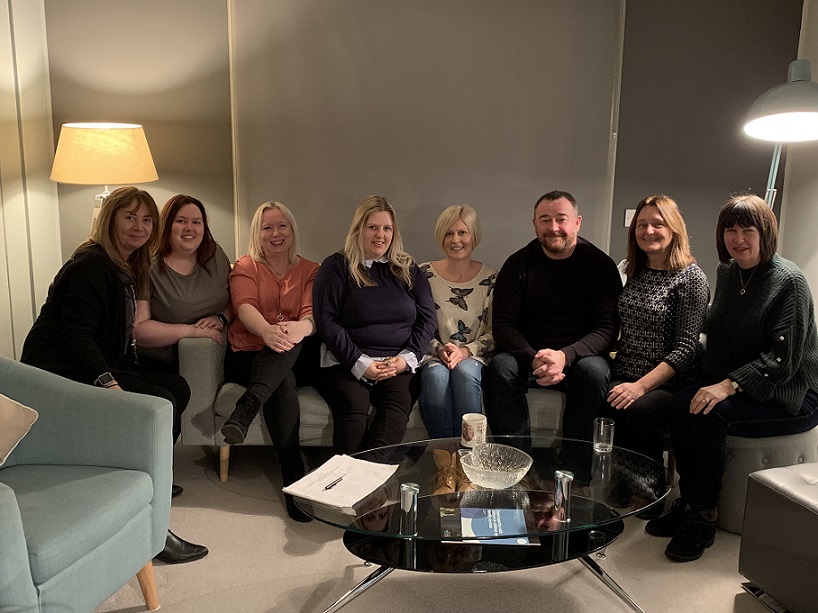
This Care Experienced Week read about the support our Leaving Care Team provides.
Take a moment to remember what it was like to be 16. Who helped you navigate the highs and lows of being a young adult? For most the answer will be either or both parents.
Now imagine if your mum and dad hadn’t been there for you. That you’d grown up facing the trials and tribulations of childhood without a stable family to turn to. How would you have coped?
For young people working with our Leaving Care Team those traditional family relationships either don’t exist or are fractured.
At 16 they have two choices – remain in care up to their 21st birthday or leave care and live on £57.90 a week, a big ask for anyone never mind a young person with limited life skills or family support.
“The first thing we say to young people is don’t leave care,” said Mags Girvan, a member of the Leaving Care Team (pictured third from the left). “That might sound strange given our team name, but our role is to help them prepare for independent living. The longer they remain in care the more time we have to work with them to build the skills needed to live independently.”
Currently the team work with 140 young people aged 15 to 21 who are or have been looked after. On average they clock up 20,000 miles a year travelling to visit young people living in residential placements from Dunoon to Dumfries.
That mileage will significantly reduce as a series of inter-connected projects help realise the ambitions of our Council of the Future Closer to Home strategy, which aims to strengthen families so that more children can remain safely at home or within their own community.
Establishing a bond
The first contact a young person has with the team is aged 15½. They then start working with a key worker to draw up a pathway plan that aims to strengthen their resilience and helps them with learning, work, money, where they live, health and wellbeing as well as rights and legal issues.
“Over the course of working with us the young people will eventually leave care so we help them with all the practical stuff like setting up a bank account, getting a National Insurance number, budgeting and training. We’ll help them plan for their future – whether that’s securing work placements, housing plans, mentoring or applying to further education. All the things parents or family would traditionally help with.
“We also provide emotional support. Most of the young people we work with have experienced abuse, neglect, loss. I don’t think anyone can imagine what it feels like not to have the love and support of a parent. That’s why we assume every young person we come in contact with has experienced trauma. Sometimes we know about it, sometimes it comes out after three, four years because that’s how long it takes them to process and talk about what has happened to them.
“During our time working with the young people we become more than a Corporate Parent, we become friend, mum, aunty, grandma and grandpa all rolled into one. We personally invest in their future and try to prepare them the best we can to be successful in life as we would our own child.”
Setting goals
But what does success look like? “When you feel they’re reaching their potential and goals. Some are just happy to work with us and move into a tenancy and keep their heads above water; others go on to further education. The Care Experienced Student Bursary is helping an increasing number of the young people we work with do that.”
For Iona Markey (pictured second from the left), who currently works with 22 young people, success is ensuring they have aspirations and goals and that they believe they have a future.
She said: “Many young people growing up in care don’t have a lot of control over their life and many put a timeline on themselves because of low self-confidence and self-esteem. Part of our work is to show them they have opportunities and are allowed to have dreams and aspirations as they don’t have the family connections that would normally open up the world to them.”
